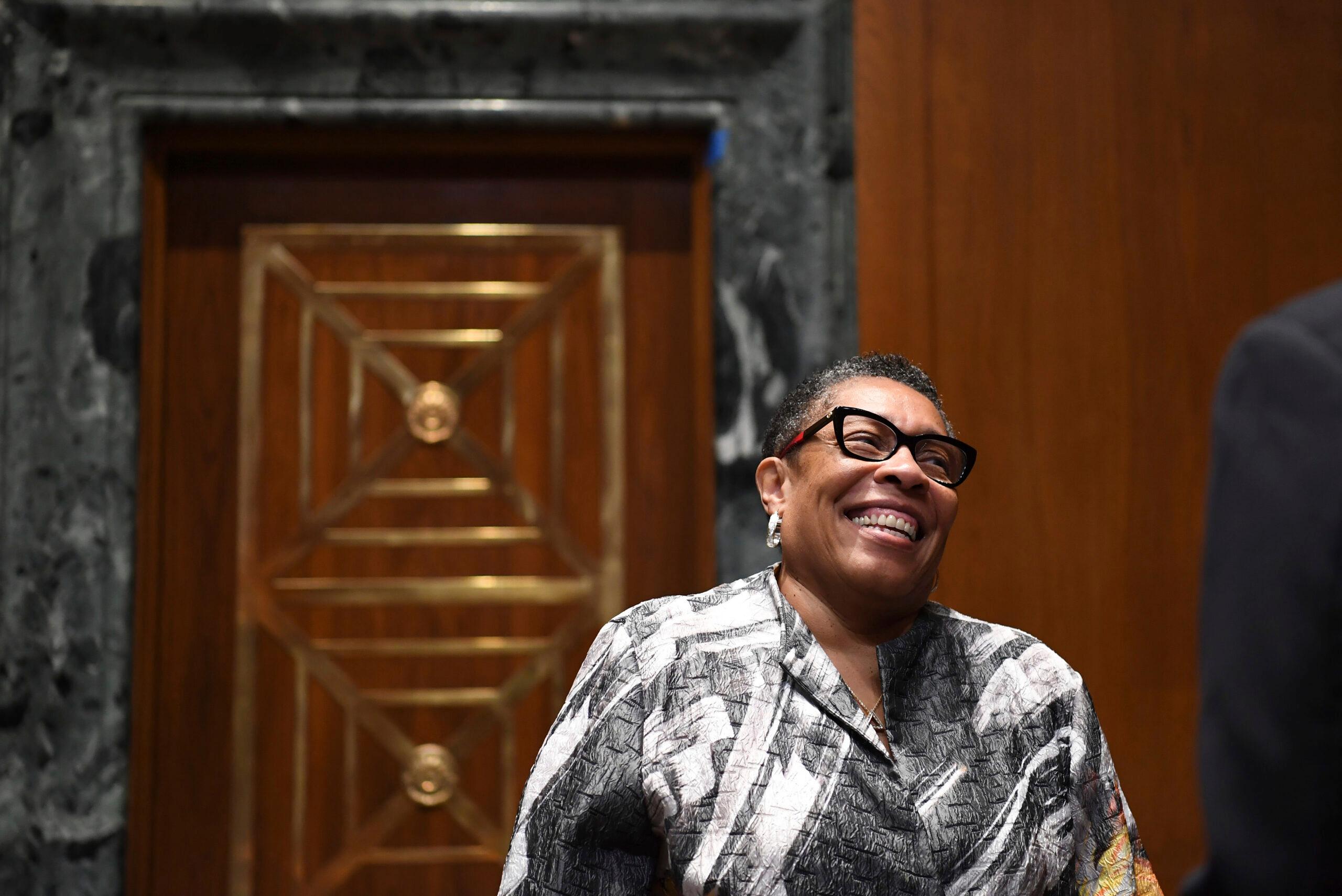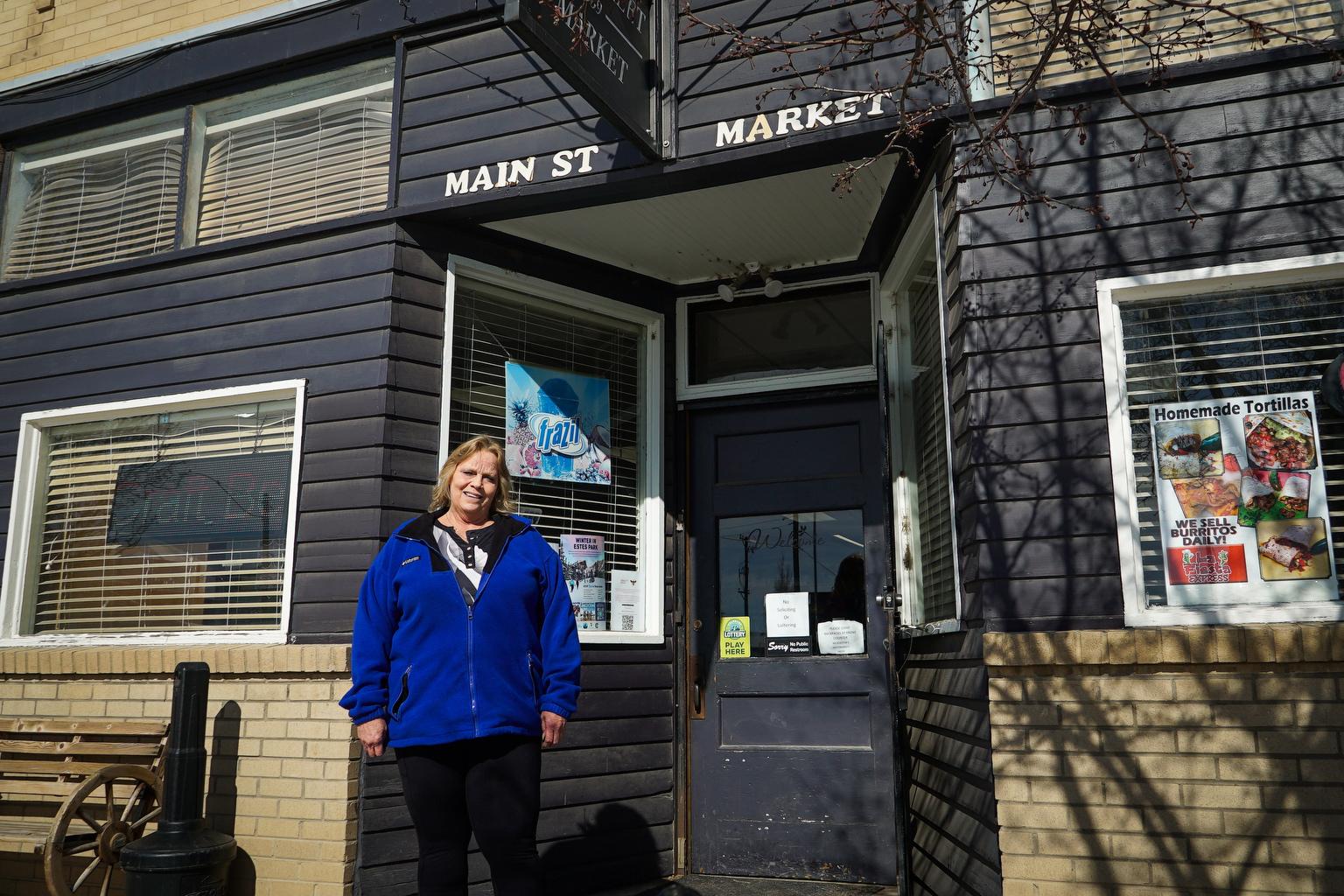
As the federal government pumps billions into the national housing crisis, it’s time to end a moratorium on evictions that kept millions of renters in their homes through the pandemic, Housing and Urban Development Secretary Marcia Fudge said Thursday.
“There is more than $40 billion in the system to make sure that we can bring people current with their rents or their mortgages,” Fudge told Colorado Matters. “… I think that, ultimately, we have to look at all sides of the situation. So not only the renters, but also the landlords. And so we believe that July 30 is the proper time to make sure that all of the resources get into the right hands
The moratorium is set to expire July 30. It applies to people who made less than $99,000 in 2020 or 2021, or $198,000 as a couple. It only applies to cases where someone faces homelessness because of lost income or extraordinary medical expenses during the pandemic.
Ending that time-out will affect millions who’ve fallen behind on rent or mortgage payments nationwide. A new state law that takes effect in October will cushion the blow, allowing renters to repay their debts and avoid evictions through the courts, providing weeks of extra time.
The federal government is also offering financial help through the Colorado Emergency Rental Assistance Program and other resources.
Fudge was in Colorado earlier this week to tout local housing programs and to promote the Biden administration’s plans for new programs to ease the crisis. She spoke with Colorado Matters from Washington, D.C.
Interview Highlights
On homelessness:
A HUD report estimated almost 600,000 people were on the streets nationwide in 2019. Experts say the pandemic has made the situation worse:
"It is a crisis, not just in Denver or in Colorado, but across the entire United States. And part of the problem is because we have not invested in low-income and moderate housing in a very long time. We have not put the kinds of resources into wrap-around services that we should. I mean, because we need to make sure that people who are homeless are not only moved to stable housing, but have the kind of support they need to stay there. So that might mean job training. It may mean healthcare. It may mean education. There are many things we can do to help people."
On increasing the stock of available housing:
The median cost of a home in Colorado is more than $500,000.
"There's (President Joe Biden’s proposed) Build Back Better plan, which is asking for as much as $300 billion to build two million new housing units. We are looking at how we can give incentives for people to build, so we are increasing the value of low-income housing tax credits. We are looking at how we provide resources through the housing trust fund, so that even when those homes are built, we can bridge the gap between what a person who is just middle income can afford and what it costs to build. So we are working on the problem, but it's going to take all of us to do it because there are zoning issues and planning issues that we have to get through. There are land issues that we have to get through, and that's not a federal government problem. Those are things that are done by the local community. So we need local communities to help, and we need the federal government to work with them."
On housing shortages in resort areas:
Many workers are making longer commutes or leaving their jobs entirely.
"I would suggest that the people who need workers impress upon their elected officials, their mayors, their council people, their state people that they need to find more ways to build low-income and moderate housing. Because if they don't, the situation is not going to get better, it is going to get worse. You can't say that ‘I live in an exclusive community and I can't get people the kind of transportation to get there and pay them enough money in wages to get there and make it profitable for them, or at least affordable.’"
Interview Transcript
Avery Lill: HUD Secretary Marcia Fudge described the nation's housing situation as dire when she was in Colorado earlier this week. The problem is everywhere and homelessness is a huge one.
HUD Secretary Marcia Fudge: “Where would you be if you didn't have a place to live? We are in the richest nation in the world. No one should sleep on a street, in a tent, under a bridge, on a bench. No one.”
AL: Then there are people who are out of jobs and behind on their payments, plus rent and home prices are skyrocketing.
MF: “There is no place in the country today where a person making minimum wage can even afford a two-bedroom apartment. No way.”
AL: Marcia Fudge joins us now from Washington DC. Secretary, welcome.
MF: Thank you. Thank you so much for having me.
AL: You use the word dire to describe what's going on. Even before the pandemic, your department estimated about 10,000 people in Colorado were experiencing homelessness. The census bureau estimates about 80,000 people are behind on rent. One study ranked Colorado among the 10 worst states for housing affordability. How did things get so bad?
MF: Well, I think it's a crisis partially of our own making. And I call it a crisis because it is. HUD just issued a few months back, what we call our “Point in Time” report. It showed that on any given night in 2019, which we know was pre-COVID, more than 580,000 people were homeless in this country. And I think that it is a crisis and so COVID has just made the problem worse. We have homeless veterans on the street who have served their nation (do) not have a place to lay their head. It is a crisis not just in Denver or Colorado but across the entire United States. And part of the problem is because we have not invested in low-income and moderate housing in a very long time. We have not put the kinds of resources into wraparound services that we should. We need to make sure that people who are homeless are not only moved to stable housing, but have the kind of support they need to stay there. So that might mean job training. It may mean healthcare. It may mean education. There are many things we can do to help people. We just have not done it, and so the crisis has gotten worse by the day.
AL: President Biden's first relief package, the American Rescue Plan, it provided billions in aid for people experiencing homelessness. Can you point to an example of an overall approach to the problem or a specific program that you've seen that might help improve some of these issues that you're pointing to?
MF: Well, there are two things I think that every single community should be asking themselves about. One is the Emergency Rental Assistance Program, which we know there's about 40 plus billion dollars in that fund alone. We know if we can get those resources through vouchers to the people who need them, we should at least not see an awful lot of people falling off the cliff because they're being evicted or foreclosed upon when we are in the moratorium at the end of this month, which means that the resources have to get through the cities and the counties and through the villages where these things are happening. But what we have found is that we need to provide more assistance to make sure that the money gets through because there's a clog somewhere, and so we're talking to mayors and governors every day to try to make sure that we can help them at least get caught up.
MF: The other major problem, quite frankly, is that we have not invested in building new housing. And so, when I was in Denver, to hear that the average price of a home in Denver is about $700,000, I was in Boulder and they're saying it's over a million. There is no affordability because there is not enough supply to meet the demand, and so we have to find ways to build new housing. That is the only real answer to this. What is happening is those people who can afford to build housing, can't because the price point is so high, and so they take up a housing of the people who are less fortunate. It is a vicious cycle that the only thing we can do is build more.
AL: You talk about a clogged system. Are you talking about in terms of difficulty for people who need those resources to apply for the resources?
MF: I think it's more difficult for people to understand how to navigate the system and to know what things are available to them. I'm going to, once again, just use Denver. Denver has not a lot of land available to build new housing, but I'm also not so sure that the various people that are in place to assist are able to do their jobs. Let's just say that we've given Denver 50 vouchers. I'm just using a number off the top of my head. There are not 50 landlords who are willing to take those vouchers, because they can make more money from people who are wealthy or people who have better and higher means. And so people who are looking for affordable places to live just can't find it.
AL: How do you solve that kind of disconnect from a federal level?
MF: Well, we're doing that in a lot of ways now. The president has, as you know, two parallel pieces of legislation. One obviously is infrastructure, where we're talking about doing things like making sure every single household has high-speed internet or broadband, clean water, fixing roads and bridges, the standard kinds of infrastructure. And then there's the Build Back Better plan, which is asking for as much as $300 billion to build two million new housing units. We are looking at how we can give incentives for people to build. So we are increasing the value of low-income housing tax credits. We are looking at how we provide resources through the Housing Trust Fund, so that even when those homes are built, we can bridge the gap between what a person who is just middle-income can afford and what it costs to build. So we are working on the problem, but it's going to take all of us to do it because there are zoning issues and planning issues that we have to get through, there are land issues that we have to get through, and that's not a federal government problem. Those are things that are done by the local community. So we need local communities to help, and we need the federal government to work with them.
AL: Encampments in cities, folks who are putting up tents in public spaces, it makes homelessness very visible. As the housing secretary, what are your personal reflections when you see folks seeking shelter this way?
MF: I'm saddened quite frankly. I mean, there are times when it really does literally bring me to tears to see what goes on in the richest nation in the world. There is no reason that we should not be able to house people in need. Now I do know that every single person who is homeless or at risk of being homeless has a different situation. I mean, there's no cookie-cutter answer for any of it. But what we do know, we know where to find people, we know how to assess what their situation is and to then help. We just have not put the resources to it that we should have. Right now the resources are there. Through the Rescue Plan that the president ushered through the Congress, again, I say there's $10 billion sitting there waiting for continuums of care, waiting for cities, waiting for counties to move that money in a direction that is going to get people off the street into safe homes.
I'll give you some examples. I’m in Washington, DC, they're talking about building new housing that is not congregate, but maybe small units that we can move people into. In Los Angeles, they're buying up motels and hotels and creating one-bedroom kinds of places for people to live and not in a shelter type of an environment. There are many ways to do it. It's up to the local community to determine how, but we have the resources.
AL: In Colorado in some places, including Denver, officials conduct sweeps. They come in and force campers to relocate. I hear you talking about building new housing. But what are your thoughts on that policy as people await that kind of new housing?
MF: Well, I don't really know much about the policy, but what I do know is that every single person in this country, no matter their status, or no matter their economic standing, should be treated with dignity and with respect. I know that there are laws that have to be followed and I do believe people should live and work within the confines of the law. I as well know that all of us in this country have a responsibility to take care of those people who need us most. I don't know the policy, but I would suggest that we need to find ways so that we don't have to have these encampments. We need to find places, whether it be temporary or permanent, but we need to put people in a position where they are safely housed and don't have to stay in a tent.
AL: Let's talk about the pandemic and the housing crisis a little more. A federal moratorium on evictions is scheduled to expire at the end of July. We mentioned that the census bureau estimates about 80,000 Coloradans are behind on their rent. The state has some new laws that will slow down the eviction process and help folks who are behind on their payments, but why not extend the moratorium for a while?
MF: Well, I think it can't go on forever. We have come to the decision that as of July 30th, there is more than $40 billion in the system to make sure that we can bring people current with their rents or their mortgages. It is just a matter of being sure that we can get the money through the system, because you have to realize that people, landlords, they need their resources too, that people who are in the situation that they need the kind of forbearance and assistance that we are giving them, have those resources. We cannot at this point continue to move forward with a moratorium with the kind of resources that are available. So what we're asking is for every community to make sure that they use their share of the resources, their share of the vouchers, to be sure it gets into the hands of people who need it right away. I think that ultimately we have to look at all sides of the situation. So not only the renters, but also the landlords. We believe that July 30th is the proper time to make sure that all of the resources get into the right hands.
AL: Before we go I also want to ask you about a particular problem in Colorado resort areas right now, and I believe this happens in similar areas around the country, where workers can't afford to live where they work. They end up with longer commutes or give up the job, and employers end up without the workers they need. Are there specific solutions you'd suggest in those communities?
MF: Well, I would suggest that the people who need workers impress upon their elected officials, their mayors, their council people, their state people, that they need to find more ways to build low-income and moderate housing. Because if they don't, the situation is not going to get better; it is going to get worse. We know that the Jobs Plan that the president has been talking about does create millions of construction jobs, jobs on rail, jobs on roads, but people have to be committed to helping other people. You can't say that I live in an exclusive community and I can't get people the kind of transportation to get there, pay them enough money in wages to get there and make it profitable for them, or at least affordable. It is a problem that is looking for a solution that we know what the solution is.
AL: Secretary Fudge, thank you for joining us. Marcia Fudge is the U.S. Secretary of Housing and Urban Development. She's a former U.S. Congresswoman from Ohio.









